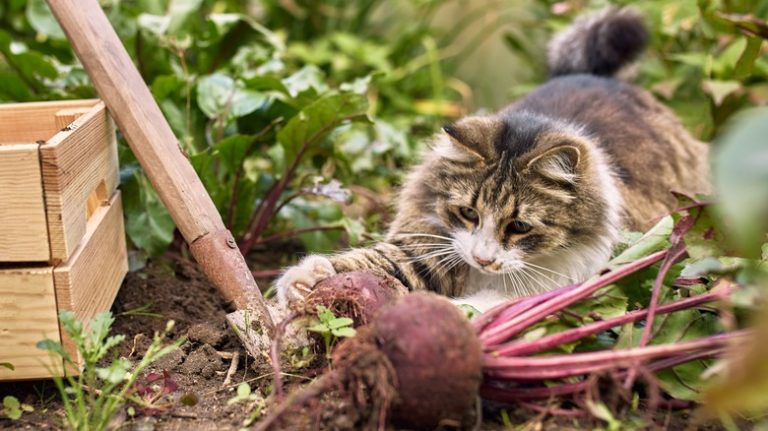Black pepper, a spice that’s likely sitting in your kitchen right now, has a lot more uses than you might expect. From deterring ants and squirrels to aiding in plant health and even stepping into the role of a natural cleaning agent — it’s quite a versatile ingredient. But let’s take a step back and really get to know this common, yet remarkable, spice.
Scientifically known as Piper nigrum, black pepper is part of the Piperaceae family. The peppercorn is a small, round fruit known for its pungent flavor and aroma. Before it becomes the familiar spice, it undergoes a drying process that transforms its appearance and texture. As they dry, they become shriveled and their flavor intensifies. According to a 2024 study published by Comprehensive Reviews in Food Science and Food Safety, piperine is the alkaloid responsible for pepper’s distinctive pungency. This compound not only lends the spice its characteristic heat, but also contributes to various beneficial properties that extend beyond culinary applications.
Black pepper comes in several forms, from whole peppercorns to the ground-up variety. Black pepper oil, an essential oil, is extracted from peppercorns and widely used for its concentrated properties. A key takeaway here is that black pepper stands out as more than just a spice — it’s a testament to the unexpected capabilities of everyday items — even ones that are conventionally used only as a flavoring for food. Let’s take a look at all the clever ways you can use pepper in and around your home.
It acts as a natural ant repellent
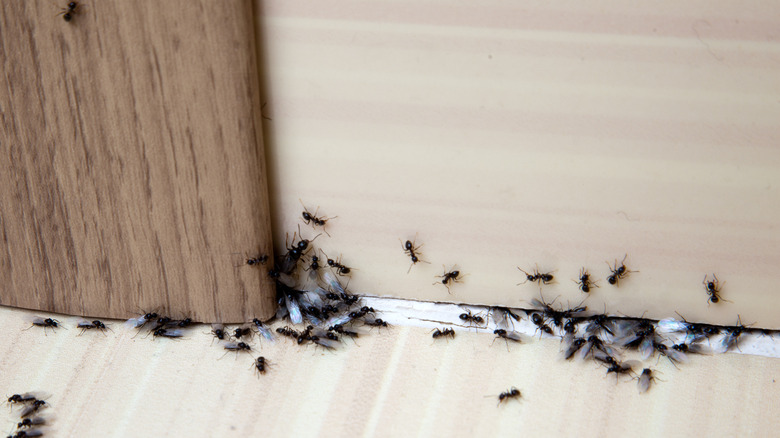
Ants can quickly turn your home into their playground. But before you reach for harsh chemicals, consider this: Black pepper, a common spice in your pantry, could be your new best friend in the battle against ants. It could be the sharp characteristic of piperine in black pepper that seems to throw ants off their game. A 2024 study published in the Journal of Engineering and Applied Sciences sheds light on this. It revealed that black pepper had a promising repellent effect on the odorous house ant. Although the study didn’t test a wider variety of ants, its findings are nonetheless encouraging.
Ants, known for their incredible navigation skills and group dynamics, can become a real headache in the home. They’re not just a nuisance; they can contaminate food and even damage property. Thanks to black pepper’s insecticidal properties, you may be able to eliminate them. Start by sprinkling ground black pepper directly in areas where you’ve noticed ant activity. This simple action can help deter ants. For a stronger impact, and one that may also actually kill the ants rather than just deter them, prepare a black pepper spray: mix pepper or pepper essential oil with water in a spray bottle. Then, generously spray this mixture along known ant trails and their frequent gathering spots. It’s important to reapply this solution regularly, especially after cleaning or rain, as these conditions will wash away the spray and therefore diminish its effectiveness.
It may help protect your plants from aphids
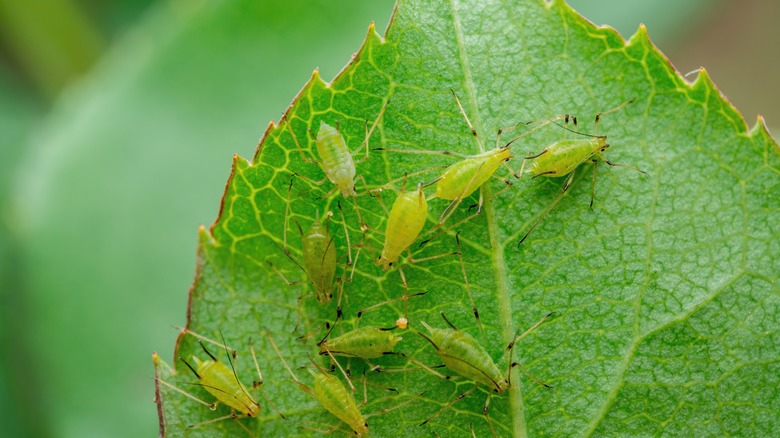
If you’re a plant lover, you’ve likely waged war against aphids at some point. These tiny, sap-sucking pests are the bane of many gardeners and indoor plant enthusiasts. Aphids, which come in various colors, such as green, black, or pink, can quickly overrun your plants, leaving a trail of damage in their wake. They feed on the sap of plants, weakening them, and can even transmit plant diseases. In comes black pepper to lend a helping hand to get rid of aphids. A 2024 study in the journal Molecules brought some interesting news to light. Black pepper oil showed significant insecticidal properties, achieving an 80% mortality rate when used against the green peach aphid. This is particularly noteworthy because green peach aphids are known for their resilience.
Now, you might be wondering how to harness this power in your own garden or home. The truth is, the information on creating an effective aphid-repelling concoction with black pepper is still a bit sparse. But don’t let that deter you! A bit of experimentation might be in order. You can start by mixing small amounts of black pepper oil with water, and perhaps a drop of mild detergent to help it stick to plant leaves. Test this mixture on a small, inconspicuous area of your plant first. After all, it’s always better to be safe than sorry, especially when dealing with delicate plants. If the mixture appears to be working, you might have to reapply after a few days, especially if rain is expected.
Rats and mice hate it
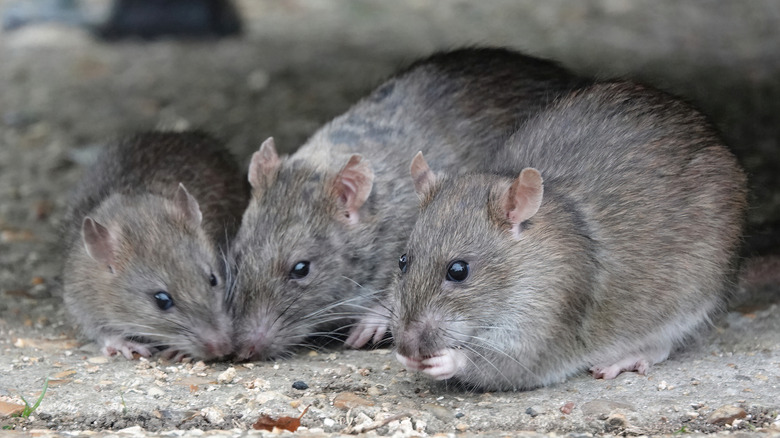
Nigel Harris /Getty Images
Dealing with rodents can feel like a never-ending battle, right? You might have tried various methods, but have you ever thought of using black pepper as a deterrent? Interestingly, some pest control companies have picked up on the power of pepper. They suggest that sprinkling pepper flakes in the right spots can stop rodents in their tracks. Here’s the scoop: the strong scent of black pepper irritates the noses of these critters. Imagine a rat or mouse sniffing around only to get a noseful of pepper. It’s so irritating for them that they want to get away from it as fast as possible. The pepper, in essence, acts like a natural barrier. Now, it’s fair to say that the scientific backing for this is not exactly robust. But given that black pepper is natural and environmentally friendly, it’s definitely worth considering since it sidesteps the issues that come with harsher chemical repellents, both for the environment and for our health.
A little word of caution, though: This method may require consistent reapplication. This is especially true outdoors, where the wind might blow away your pepper barriers, so you’ll need to keep an eye on things and reapply as needed. If you’re feeling adventurous, you can even combine this with other natural pest control tactics. For instance, peppermint oil is another great natural mice repellent. Soaking some cotton balls in peppermint oil and placing them around your home can complement the pepper flakes, giving you a double barrier against those pesky rodents.
It may help keep squirrels away from your home
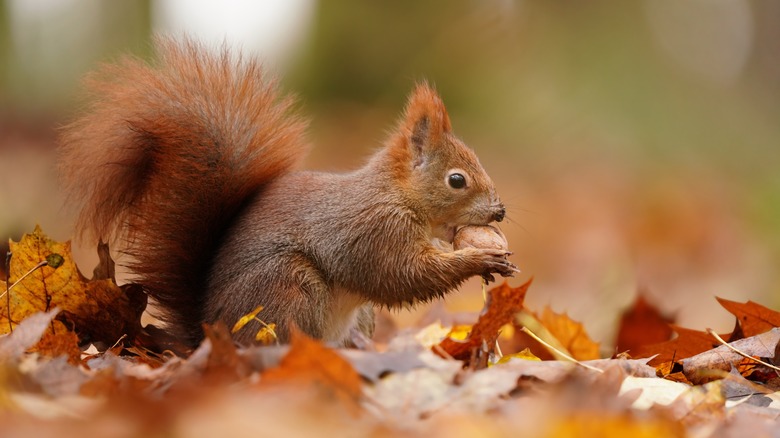
Monika Surzin/Shutterstock
Squirrels, while adorable in their natural habitat, can become quite a nuisance when they invade residential areas. They’re known for their playful antics, but these can quickly turn problematic as they gnaw on structures and uproot gardens. In the search for an all-natural deterrent, black pepper emerges as a potential solution, echoing its effectiveness against earlier mentioned rodents, like rats and mice. Pest control companies advise that, when sprinkled in areas where squirrels are a problem, such as gardens, the scent of black pepper acts as a barrier. It’s not that the pepper harms them; it’s more about creating an environment that they’d prefer to avoid. The same goes for your garden — you can sprinkle black pepper in the areas you want to protect.
However, it’s crucial to understand that, just like with the other rodents, the evidence backing black pepper as a squirrel repellent is largely anecdotal. While there have been observations and reports of its effectiveness, there isn’t a substantial body of scientific research to fully endorse these claims. Also, persistence is key. The effectiveness of black pepper may diminish over time, particularly in outdoor settings where elements like wind and rain can wash away or disperse the spice. Regular reapplication might be necessary to maintain its effectiveness in getting rid of squirrels. In summary, while not a guaranteed solution, using black pepper to deter squirrels offers a simple, natural method to address the challenges posed by these agile creatures.
Mix in with bird feed to deter chipmunks and squirrels
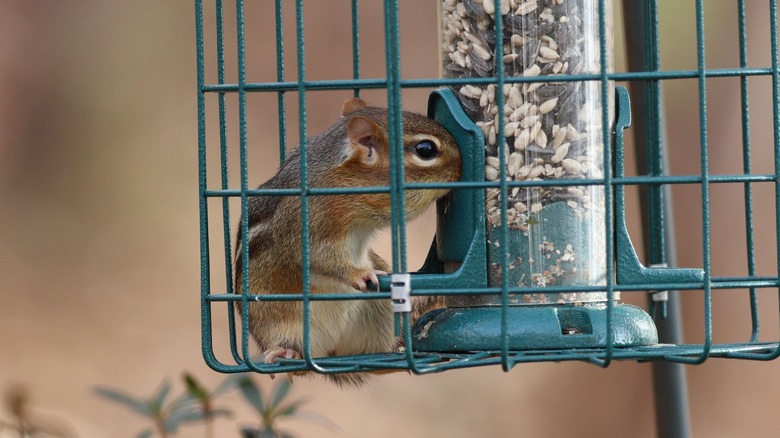
Wirestock Creators/Shutterstock
Now for another set of rodents — chipmunk and squirrels — both of which are known to raid bird feeders. These agile creatures are not only a nuisance for humans but also for birds. It’s common to see them acrobatically attempting to access the seeds in the feeder. This not only deprives the birds of their food, but can also deter them from visiting your feeder altogether. In this ongoing tussle between squirrels and bird feeders, black pepper offers an interesting solution, and this time, it’s more about taste than scent.
Here’s a neat trick: Mix black pepper into your bird feed. The idea is that while squirrels and other similar animals can taste and are put off by the spiciness of the pepper, birds are not. Apparently, squirrels have more taste buds than birds, leading them to shy away from food seasoned with pepper. Birds, on the other hand, lack this sensitivity. This difference in taste perception can be used to keep your bird feeder exclusive to birds.
Now, it’s important to mention that much of the evidence for using black pepper in this way is anecdotal. Most wildlife experts typically recommend mixing chili peppers, which contain capsaicin — the component responsible for the pepper’s heat — found predominantly in their seeds. While black pepper may not be as popular, there’s no harm in trying it out. It might simply be the case that studies on black pepper are more limited.
Use it to help prevent fungi and mold in plant soil
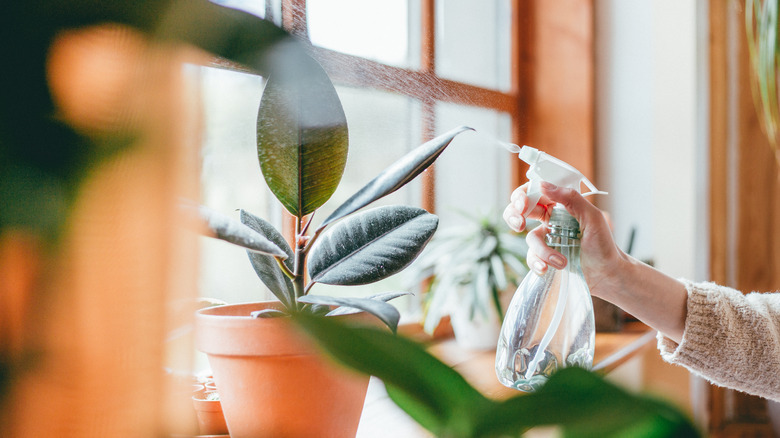
Visualspace/Getty Images
Now, we’ve already seen how versatile black pepper can be around the house and garden, and it turns out it might just be a handy ally in the fight against plant mold, too. A 2024 study published in the Oriental Journal of Chemistry really put black pepper in the spotlight, showing off its antifungal properties. To add to that, a 2024 study from the Iraqi Journal of Science took a closer look at how black pepper can be particularly effective against gray mold on tomato plants. This pesky fungus is scientifically known as Botrytis cinerea. What’s interesting about this study is that it found black pepper didn’t just tackle the existing mold — it actually boosted the tomato plants’ resistance against this fungal foe. This means using black pepper oil might help your plants not only recover from a mold attack, but also prepare them to better resist future outbreaks.
While these findings are quite promising, it’s important to keep in mind that there’s a difference between laboratory conditions and your garden. Outdoors, you have a whole bunch of variables, like weather and other environmental factors, that can affect how effective your black pepper treatment is. And since we don’t have a lot of specifics on the exact amount of black pepper oil needed for different plants, a bit of trial and error might be in order. Start with small amounts, try it out on a few leaves, and see how your plants respond.
Use the oil for cleaning purposes

Romix Image/Shutterstock
When you think of black pepper, cleaning might not be the first thing that comes to mind, but it turns out this spice might have some hidden talents in that department, too. A 2024 study published in the Food and Nutrition Journal has brought some interesting facts to light about black pepper. This study focused on black pepper’s antibacterial properties and found it to be effective against some pretty notorious bacteria, namely Escherichia coli (E. coli) and Salmonella enterica. Some strains of these bacteria can lead to serious food poisoning and can spread to surfaces in the home. This is why keeping your home germ-free is crucial to prevent these bacteria from causing health problems.
That being said, the study notes that these bacteria were more sensitive to a nanoemulsion of black pepper essential oil than to the pure essential oil. A nanoemulsion consists of extremely small droplets of the essential oil dispersed within another liquid, increasing its surface area and potentially boosting its antibacterial effectiveness. This additional information highlights the fact that lab studies don’t always translate directly into real-world effectiveness, since environmental factors can play a significant role in how well these agents work outside of controlled conditions. So, relying solely on black pepper for cleaning might not cut it. If you wish to use it, you might have to combine black pepper oil with other natural cleaning agents, such as white vinegar.



